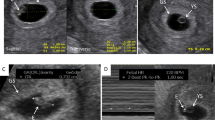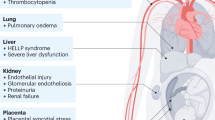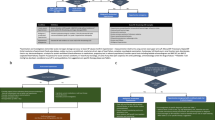Abstract
OBJECTIVE:
To determine the prevalence of low cortisol values and to evaluate clinical responses to hydrocortisone in ill term and near-term newborns.
STUDY DESIGN:
Retrospective cohort study including infants ≥35 weeks gestational age who were mechanically ventilated, received vasopressor therapy, and had a cortisol concentration obtained for evaluation of vasopressor-resistant hypotension. In those infants treated with hydrocortisone, physiologic responses were evaluated and correlated with cortisol values (<15 vs ≥15 μg/dl).
RESULTS:
A total of 32 infants had cortisol values obtained; 18 (56%) were <15 μg/dl. In all, 21 infants were treated with hydrocortisone of whom 13 had cortisol values <15 μg/dl. These 13 infants showed decreased heart rate, dopamine support and fluid bolus requirements after treatment, compared to infants with values ≥15 μg/dl (n=8).
CONCLUSIONS:
A significant number of hypotensive, mechanically ventilated infants have evidence of inadequate adrenal function. Hydrocortisone therapy resulted in hemodynamic stabilization in this population.
This is a preview of subscription content, access via your institution
Access options
Subscribe to this journal
Receive 12 print issues and online access
$259.00 per year
only $21.58 per issue
Buy this article
- Purchase on Springer Link
- Instant access to full article PDF
Prices may be subject to local taxes which are calculated during checkout

Similar content being viewed by others
References
Baldwin WA, Allo M . Occult hypoadrenalism in critically ill patients. Arch N Surg 1993;128:673–676.
Bone M, Diver M, Selby A, Sharples A, Addison M, Clayton P . Assessment of adrenal function in the initial phase of meningococcal disease. Pediatrics 2002;110:563–569.
Briegel J, Kellermann W, Forst H, et al. Low-dose hydrocortisone infusion attenuates the systemic inflammatory response syndrome. Clin Invest 1994;72:782–787.
Finlay WE, McKee JI . Serum cortisol levels in severely stressed patients. Lancet 1982;1:1414–1415.
Joosten KFM, De Kleijn ED, Westerterp M, et al. Endocrine and metabolic responses in children with meningococcal sepsis: striking differences between survivors and nonsurvivors. J Clin Endocrinol Metab 2000;85:3746–3753.
Rothwell PM, Udwadia ZF, Lawler PG . Cortisol response to corticotropin and survival in septic shock. Lancet 1991;337:582–583.
Sibbald WJ, Short A, Cohen MP, Wilson RF . Variations in adrenocortical responsiveness during severe bacterial infections: unrecognized adrenocortical insufficiency in severe bacterial infections. Ann Surg 2003;186:29–33.
Soni A, Pepper GM, Wyrwinski PM, et al. Adrenal insufficiency occurring during septic shock: incidence, outcome, and relationship to peripheral cytokine levels. Am J Med 1995;98:266–271.
Lamberts SWJ, Bruining HA, De Jong FH . Corticosteroid therapy in severe illness. N Engl J Med 1997;337:1285–1292.
McKee JI, Finlay WE . Cortisol replacement in severely stressed patients. Lancet 1983;1:484–485.
Cooper MS, Stewart PM . Corticosteroid insufficiency in acutely ill patients. N Engl J Med 2003;348:727–734.
Claussen MS, Landercasper J, Cogbill TH . Acute adrenal insufficiency presenting as shock after trauma and surgery: three cases and review of the literature. J Trauma 1992;32:94–100.
Kidess AI, Caplan RH, Reynertson RH, Wickus GG, Goodnough DE . Transient corticotropin deficiency in critical illness. Mayo Clin Proc 1993;68:435–441.
Annane D, Sébille V, Charpentier C, et al. Effect of treatment with low doses of hydrocortisone and fludrocortisone on mortality in patients with septic shock. JAMA 2002;288:862–871.
Ng PC, Lam CWK, Fok TF, et al. Refractory hypotension in preterm infants with adrenocortical insufficiency. Arch Dis Child Fetal Neonatal Ed 2001;84:F122–4.
Scott SM, Watterberg KL . Effect of gestational age, postnatal age, and illness on plasma cortisol concentrations in premature infants. Pediatr Res 1995;37:112–116.
Helbock HJ, Insoft RM, Conte FA . Glucocorticoid-responsive hypotension in extremely low birth weight newborns. Pediatrics 1993;92:715–717.
Fauser A, Pohlandt F, Bartmann P, Gortner L . Rapid increase of blood pressure in extremely low birth weight infants after a single dose of dexamethasone. Eur J Pediatr 1993;152:354–356.
Gaissmaier RE, Pohlandt F . Single-dose dexamethasone treatment of hypotension in preterm infants. J Pediatr 1999;134:701–705.
Seri I, Tan R, Evans J . Cardiovascular effects of hydrocortisone in preterm infants with pressor-resistant hypotension. Pediatrics 2001;107:1070–1074.
Tantivit P, Subramanian N, Garg M, Ramanathan R, deLemos RA . Low serum cortisol in term newborns with refractory hypotension. J Perinatol 1999;19:352–357.
Davidian M . Applied Longitudinal Data Analysis, Class Syllabus (ST-732). Raleigh, NC: North Carolina State University, Spring 2002. (www.stat.ncsu.edu/~st732_info/Davidian/#syllabus).
Gunn VL, Nechyba C . The Harriet Lane Handbook. Missouri: Harcourt; 2002. p. 712, 907.
Hanna CE, Jett PL, Laird MR, Mandel SH, LaFranchi SH, Reynolds JW . Corticosteroid binding globulin, total serum cortisol, and stress in extremely low-birth-weight infants. Am J Perinat 1997;14:201–204.
Williams GH, Dluhy RG . Disorders of the adrenal cortex. In: Braunwald E, Fauci AS, Kasper DL, Hauser SL, Longo DL, Jameson JL, editors. Harrison's Principles of Internal Medicine. New York: McGraw-Hill; 2001. p. 2001–2084.
LE Roux CW, Chapman GA, Kong WM, Dhillo WS, Jones J, Alaghband-Zadeh J . Free cortisol index is better than serum total cortisol in determining hypothalamic–pituitary-adrenal status in patients undergoing surgery. J Clin Endocrinol Metab 2003;88:2045–2048.
Pittinger TP, Sawin RS . Adrenocortical insufficiency in infants with congenital diaphragmatic hernia: a pilot study. J Pediatr Surg 2000;35:223–226.
Thomas S, Murphy JF, Dyas J, Ryalls M, Hughes IA . Response to ACTH in the newborn. Arch Dis Child 1986;61:57–60.
Soliman AT, Taman KH, Rizk MM, Nasr IS, AIRimawy H, Hamido MSM . Circulating adrenocorticotropic hormone (ACTH) and cortisol concentrations in normal, appropriate-for-gestational-age newborns versus those with sepsis and respiratory distress: cortisol response to low-dose and standard-dose ACTH tests. Metabolism 2004;53:209–214.
Winter JSD . Fetal and Neonatal Adrenocortical Physiology. In: Polin RA, Fox WW, Abman SH, editors. Fetal and Neonatal Physiology. Philadelphia, PA: WB Saunders; 2004. p. 1915–1925.
Author information
Authors and Affiliations
Rights and permissions
About this article
Cite this article
Fernandez, E., Schrader, R. & Watterberg, K. Prevalence of Low Cortisol Values in Term and Near-Term Infants with Vasopressor-Resistant Hypotension. J Perinatol 25, 114–118 (2005). https://doi.org/10.1038/sj.jp.7211211
Published:
Issue Date:
DOI: https://doi.org/10.1038/sj.jp.7211211
This article is cited by
-
The use of supplemental hydrocortisone in the management of persistent pulmonary hypertension of the newborn
Journal of Perinatology (2021)
-
Adrenal insufficiency in neonates undergoing cardiopulmonary bypass and postoperative hypothalamic-pituitary-adrenal function after prophylactic glucocorticoids
Journal of Perinatology (2019)
-
An evaluation of hydrocortisone dosing for neonatal refractory hypotension
Journal of Perinatology (2017)
-
Steroid use for refractory hypotension in congenital diaphragmatic hernia
Pediatric Surgery International (2017)
-
Barriers to enrollment in a randomized controlled trial of hydrocortisone for cardiovascular insufficiency in term and late preterm newborn infants
Journal of Perinatology (2017)



